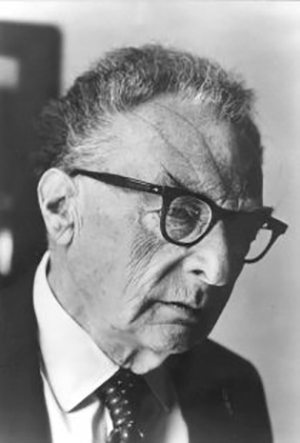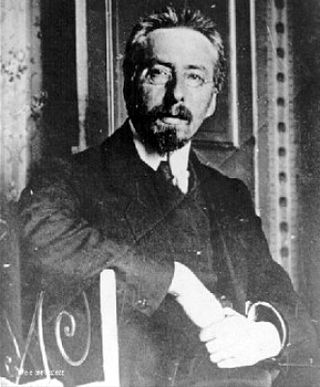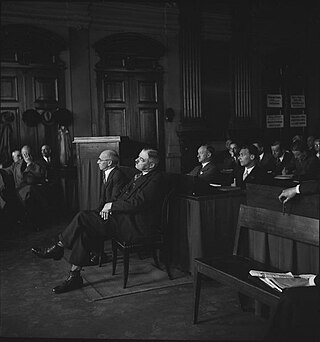External links
- CURRICULUM VITAE [ permanent dead link ].
- CTW: Abstract View Archived 2007-09-29 at the Wayback Machine Archived 2007-09-29 at the Wayback Machine
Henryk Baran is a scholar, author, and professor currently at the State University of New York, Albany (SUNY) holding a position in the Department of Languages, Literature & Culture. He is particularly immersed in the Russian language and culture. He is also an authority on the 'career' of Protocols of Zion in the former Russian Empire.
After attending the Bronx High School of Science, and achieving early admission to MIT, Prof. Baran received his B.S. in mathematics from the Massachusetts Institute of Technology in 1967. He received his M.A. in Slavic languages and Literature from Harvard University in 1969, and his Ph.D. in 1976.
Of particular interest to historians of the notorious Protocols of Zion is Baran's presentation of his research on two individuals, Sergei Svatikov (1880–1942), and Alexandre du Chayla (1885–1945). The former was a historian, and a political figure. The latter was a French nobleman who converted to Russian Orthodoxy. Both played significant roles, on the side of the prosecution against the Protocols, at the Berne Trial of 1935. Until this presentation, not much was known about these individuals apart from their public participation at said trial. Prof. Baran made his presentation (in a paper) based on Western and Russian archival repositories. His paper presents new light on the relationship among Svatikov, Du Chayla, and on other individuals who either presented evidence or testified at the Berne Trial. Other individuals considered include Elias Tscherikower, a historian, and Vladimir Burtsev, a journalist and a political figure.
Russian Silver Age literature, Russian avant-garde; poetics; history of Slavic philology within a broad intellectual and political context; history of the forgery "Protocols of the Elders of Zion"
Three-time Fulbright Award winner, Henryk Baran of the Department of Languages, Literatures, and Cultures has taught more than 60 courses in his long and distinguished career, and was recognized for his research contributions last July with an honorary doctorate from the Russian State University for the Humanities in Moscow.
Baran received his graduate training in the Slavic Department of Harvard University, where he studied with Roman Jakobson, one of the leading scholars of language, literature and linguistics in the 20th century and an expert on Russian poetry. Baran's dissertation was a study of Russian futurist poet Velmir Khlebnikov. Even before completing his dissertation, he published two papers on Khlebnikov, one in a festschrift for Taranovsky and the other in the literary journal Russian Literature. Baran's research has been included in 70 articles and book chapters, as well as four edited books. A founding editor of Elementa: Journal of Slavic Studies and Comparative Cultural Semiotics, Baran was also associate editor of the Slavic and East European Journal.
His administrative experience at UAlbany includes seven years as department chair and service as graduate adviser and coordinator for the Slavic studies program. Baran has also been invited to speak at some of the most prestigious departments and programs both here and abroad, including those at Harvard, Princeton, NYU, Ohio State University, Oberlin College, Institute of Russian Language (Moscow), Institute of World Literature (Moscow), Helsinki University and Russian State University of the Humanities (Moscow).

Roman Osipovich Jakobson was a Russian and naturalised American linguist and literary theorist.

Prince Nikolai Sergeyevich Trubetzkoy was a Russian linguist and historian whose teachings formed a nucleus of the Prague School of structural linguistics. He is widely considered to be the founder of morphophonology. He was also associated with the Russian Eurasianists.
Slavic or Slavonicstudies, also known as Slavistics, is the academic field of area studies concerned with Slavic peoples, languages, literature, history, and culture. Originally, a Slavist or Slavicist was primarily a linguist or philologist researching Slavistics. Increasingly, historians, social scientists, and other humanists who study Slavic cultures and societies have been included in this rubric.

Mikhail Aleksandrovich Sholokhov was a Russian novelist and winner of the 1965 Nobel Prize in Literature. He is known for writing about life and fate of Don Cossacks during the Russian Revolution, the civil war and the period of collectivization, primarily in his most famous novel, And Quiet Flows the Don.
Russian formalism was a school of literary theory in Russia from the 1910s to the 1930s. It includes the work of a number of highly influential Russian and Soviet scholars such as Viktor Shklovsky, Yuri Tynianov, Vladimir Propp, Boris Eichenbaum, Roman Jakobson, Boris Tomashevsky, Grigory Gukovsky who revolutionised literary criticism between 1914 and the 1930s by establishing the specificity and autonomy of poetic language and literature. Russian formalism exerted a major influence on thinkers like Mikhail Bakhtin and Juri Lotman, and on structuralism as a whole. The movement's members had a relevant influence on modern literary criticism, as it developed in the structuralist and post-structuralist periods. Under Stalin it became a pejorative term for elitist art.

Juri Lotman, a prominent Russian-Estonian literary scholar, semiotician, and historian of Russian culture, worked at the University of Tartu. He was elected a member of the British Academy (1977), the Norwegian Academy of Science and Letters (1987), the Royal Swedish Academy of Sciences (1989) and the Estonian Academy of Sciences (1990). He was a founder of the Tartu–Moscow Semiotic School. The number of his printed works exceeds 800 titles. His extensive archive includes his correspondence with a number of Russian and Western intellectuals.

Vladimir Lvovich Burtsev was a revolutionary activist, scholar, publisher and editor of several Russian language periodicals. He became famous by exposing a great number of agents provocateurs, notably Yevno Azef in 1908. Because of his own revolutionary activities and his harsh criticism of the imperial regime, including personal criticism of emperor Nicholas II, he was imprisoned several times in various European countries. In the course of his life, Burtsev fought oppressive policies from Tsarism in Imperial Russia, followed by the Bolsheviks and later Adolf Hitler's National Socialism.

Viktor Vladimirovich Khlebnikov, better known by the pen name Velimir Khlebnikov, was a Russian poet and playwright, a central part of the Russian Futurist movement, but his work and influence stretch far beyond it. Influential linguist Roman Jakobson hailed Khlebnikov as "the greatest world poet of our century".
The Prague school or Prague linguistic circle is a language and literature society. It started in 1926 as a group of linguists, philologists and literary critics in Prague. Its proponents developed methods of structuralist literary analysis and a theory of the standard language and of language cultivation from 1928 to 1939. The linguistic circle was founded in the Café Derby in Prague, which is also where meetings took place during its first years.

Boris Andreevich Uspenskij is a Russian linguist, philologist, semiotician, historian of culture.

Vyacheslav Vsevolodovich Ivanov was a prominent Soviet and Russian philologist, semiotician and Indo-Europeanist probably best known for his glottalic theory of Indo-European consonantism and for placing the Indo-European urheimat in the area of the Armenian Highlands and Lake Urmia.

The Berne Trial or Bern Trial was a famous court case in Bern, Switzerland which took place between 1933 and 1935. Two organisations, the Swiss Federation of Jewish Communities and the Bernese Jewish Community sued the far-right Swiss National Front for distributing anti-Jewish propaganda. The trial focussed on the Front's use of the fraudulent antisemitic text, The Protocols of the Elders of Zion. Ultimately decided in favour of the plaintiffs, the Front was ordered to pay a symbolic fine and court costs. However, the trial became significant both for the international coverage and also for the extensive evidence presented, demonstrating the falsehoods contained in The Protocols.
Michael Hagemeister is a German historian and Slavist, an authority on The Protocols of the Elders of Zion and on Sergei Nilus.

Sergei Grigorievich Svatikov was a Russian historian and political figure who presented critical evidence and/or testimony in 1935 in the Berne Trial regarding the notorious Protocols of Zion.
Count Armand Alexandre de Blanquet du Chayla was a French nobleman who converted to Russian Orthodoxy. He is chiefly remembered for giving crucial evidence and/or testimony for the prosecution at the Berne Trial in 1935 against the notorious Protocols of Zion.
Elias Tcherikower was a Ukrainian Jewish historian and co-founder of the Yiddish Scientific Institute (YIVO).

The Protocols of the Elders of Zion is a fabricated text purporting to detail a Jewish plot for global domination. Largely plagiarized from several earlier sources, it was first published in Imperial Russia in 1903, translated into multiple languages, and disseminated internationally in the early part of the 20th century. It played a key part in popularizing belief in an international Jewish conspiracy.
The Tartu–Moscow Semiotic School is a scientific school of thought in the field of semiotics that was formed in 1964 and led by Juri Lotman. Among the other members of this school were Boris Uspensky, Vyacheslav Ivanov, Vladimir Toporov, Mikhail Gasparov, Alexander Piatigorsky, Isaak I. Revzin, and others. As a result of their collective work, they established a theoretical framework around the semiotics of culture.
Ladislav Matějka was a Czech scholar of semiotics and linguistic theory, who translated and published many contributions to Prague linguistic circle theory. He received his doctorate in Charles University in Prague in 1948 and then emigrated to the U.S and earned a second doctorate from Harvard University. From 1956 until 1989 he taught at University of Michigan in the Slavic Department. In 1962, he founded Michigan Slavic Publications, a series that has published more than 100 volumes by authors such as Roman Jakobson and Nikolai Trubetzkoy.

Victor Ivanovich Grigorovich was a Russian Slavist, folklorist, literary critic, historian and journalist, one of the originators of Slavic studies in the Russian empire.